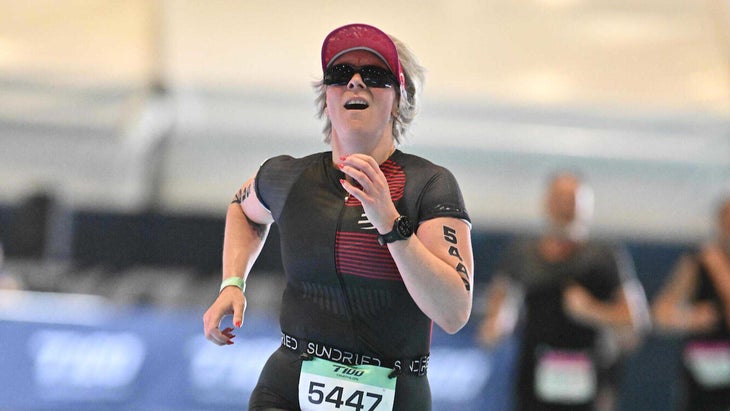New perk! Get after it with local recommendations just for you. Discover nearby events, routes out your door, and hidden gems when you sign up for the Local Running Drop.
There’s a common phenomenon that happens midway through a long and demanding triathlon season. The excitement you felt in those early months begins to fade, giving way to fatigue, flatness, and the sense that something’s off. You might even question why you signed up for this whole thing in the first place. These may be early signs of burnout, but don’t worry, you’re not alone, and burnout can be prevented.
Most advice around burnout emphasizes rest and time away from your sport. While mileage may be a contributing factor, burnout isn’t solely about doing too much; it’s also about mismanaging what the brain needs.
What burnout is (and isn’t)
Let’s clear something up: Burnout is not about laziness or weakness, and it’s not always the result of pushing your body too hard. It’s a slow and persistent depletion that interferes with your motivation and dysregulates your mood. From a sport psychology perspective, burnout is defined as a cognitive-affective syndrome, meaning it disrupts your ability to think (cognitive) and manage your emotions (affective). It consists of three components:
- Emotional and physical exhaustion
- A reduced sense of accomplishment
- Negative feelings about the benefits of your sport
Overtraining may contribute to these elements, but burnout is just as likely to stem from mental overload, emotional fatigue, or a fading sense of purpose. If left unchecked, burnout can affect your relationships and overall well-being, so it’s worth understanding the warning signs.
Red flags you might miss
As triathletes, we have a tendency to override discomfort; it’s how we do what we do. But that same mental toughness can make it easy to overlook important clues signaling burnout. Here are some red flags that often go unnoticed:
- Dreading workouts you used to enjoy
- Having trouble focusing, even during easy sessions
- Snapping at loved ones or feeling emotionally drained
- Being constantly fatigued, even after rest
- Feeling apathetic about your progress
These signs don’t mean you’re failing, nor do they suggest you should quit. They may simply be your brain’s way of asking for support.
A slow, mismanaged burn
The good news is that burnout doesn’t happen overnight and it’s rarely caused by a single trigger. Instead, it’s the result of repeated missteps and unmet mental needs that build over time. Here are the most common factors that can quietly deplete your mental and emotional reserves:
Life stress
Training doesn’t happen in a vacuum. It occurs in the midst of work pressures, family responsibilities, and other life demands. As mental health researcher Jill Colangelo says so succinctly, your body can’t tell the difference between life stress and training stress – cumulatively, it’s stress, and a lot of it. So, even if training is well-structured, unmanaged life stress can activate your sympathetic nervous system, disrupt your self-regulation mechanisms (e.g., your ability to manage effort, emotions, thoughts, and behaviors), and reduce your capacity for resilience, focus, and motivation.
Cognitive load
Triathlon is a data-rich sport, full of heart rate variability, power, sleep scores, and nutrition logs. While metrics are helpful, tracking every single one can take a toll on your attention and mental bandwidth.
Under-recovery
Not all rest is created equal. Even with built-in recovery days, you may still find it difficult to truly rest your brain. Powering through your to-do list, chilling in front of a screen, or feeling guilty for taking time “off” is common. But when recovery is shallow or inconsistent, your brain doesn’t receive the signal to downshift, which can eventually lead to burnout.
Giving the brain what it needs

Preventing burnout takes more than simply noticing the warning signs; it requires intentional care for your brain. Here are some evidence-based tips to protect your energy, drive, and love for the sport.
Take brain breaks
The brain processes a staggering 11 million bits of information per second, so give it a break! Ditch your phone and spend 20 minutes outside, using all five senses to notice your environment. Every few minutes, take a slow, deep breath. This helps reduce cognitive fatigue and activates the parasympathetic nervous system, which is critical for rejuvenation.
Lean on your support system
Triathlon training is a unique endeavor, and isolation can accelerate feelings of burnout. Prioritize spending time with people who genuinely understand you. Regular connection with teammates, coaches, a therapist, or a mental performance consultant can help you normalize your experience, process your thoughts, and gain perspective.
Broaden your identity
Newsflash: You are more than just a triathlete. Create time to nurture the parts of yourself that contribute to your complex identity. By engaging in interests outside of triathlon, you can enrich your self-concept and reduce performance pressures, which will ultimately help you train and race better.
Spend less time with numbers
Tracking is useful, but it’s also taxing. Being over-reliant on every metric adds to your cognitive load, overwhelming the very systems you rely on to stay sharp and energized. Take occasional breaks from numbers to help your brain reset, and build a burnout-proof training plan that includes regular periods of unplugged recovery.
Reconnect with joy
When training begins to feel like a drag, it’s time to re-engage with what makes it fun. Reflect on why you got into triathlon in the first place, and what used to light you up during a workout. Then find ways to bring that back, without overthinking it. Your brain craves novelty and joy just as much as structure.
A final note on burnout
Your brain is your most powerful performance tool, but it’s also your most vulnerable. It thrives on novelty, rest, connection, and a sense of purpose, so when those needs are unmet, you risk burning out. Supporting your brain protects not just your mental health, but your ability to train, adapt, and perform at your best.
